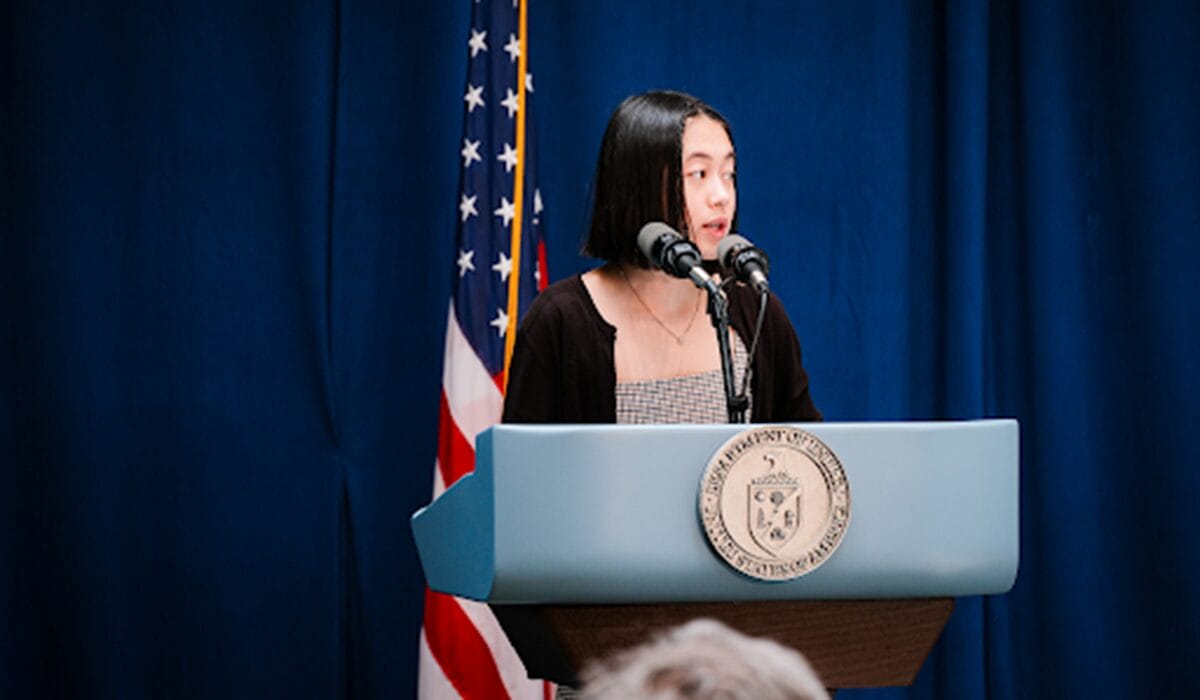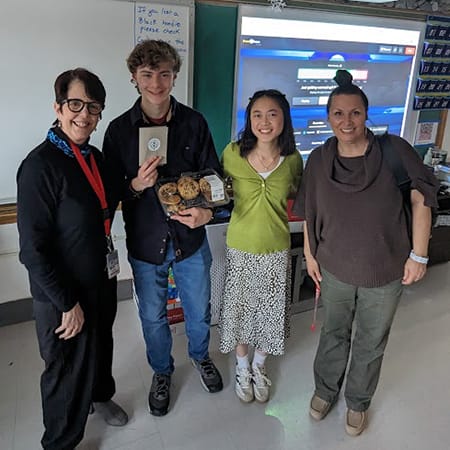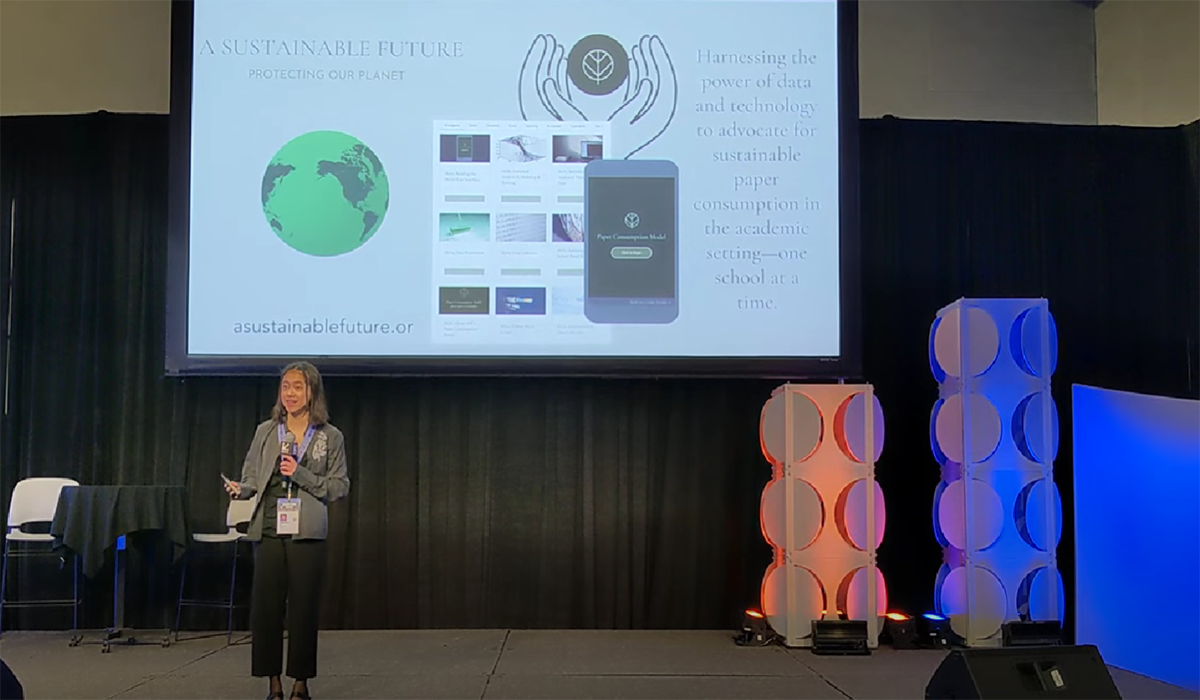The Student Turning Data into Action and Revolutionizing Sustainability in Schools

Meet Daily Point of Light Award honoree Carolyn He. Read her story, and nominate an outstanding volunteer or family as a Daily Point of Light.
Carolyn He is leading a new wave of environmental activism, combining data-driven advocacy with community leadership to address sustainability challenges at the grassroots level. As the founder of A Sustainable Future (ASF), she has spearheaded a national movement to reduce excessive printing in schools – an often-overlooked environmental issue.
Post-pandemic, Carolyn was alarmed by rampant paper waste in schools and launched the first nationwide printing study, gathering over 3.3 million data points from 54 high schools. What began as a research initiative quickly evolved into an organization dedicated to both reducing paper consumption and empowering students to become sustainability advocates. Through ASF’s Paper Consumption Model (PCM), Carolyn has helped 75 U.S. school districts reduce waste, saving 1.7 million sheets of paper (equivalent to 170 trees) and influencing the eco-literacy of over 98,000 students worldwide.
Beyond print reduction, Carolyn’s mission has expanded to fostering youth-led climate activism. Through ASF’s Paper Consumption Program, she has mentored over 200 students across nine countries, equipping them with tools to track and reduce their school’s printing habits. By focusing on behavioral change rather than just technical solutions, ASF enables students to lead impactful sustainability initiatives in their own communities. Carolyn also collaborates with major environmental organizations like Tree-Plenish, Green Schools Alliance and Sustainable Jersey for Schools, ensuring ASF’s work integrates into broader sustainability efforts.
Carolyn’s leadership extends beyond ASF, with her involvement in NASA research on wildfire impacts, discussions with New Jersey legislators on heavy metal exposure and organizing five-day Climate Conventions to educate and mobilize communities. She has spoken at major environmental conferences, including COP28, SXSW EDU and Climate Week, bringing attention to the power of student-led sustainability initiatives. Under her direction, ASF has secured over $8,000 in grants to continue expanding its programs, ensuring that schools worldwide have the tools and motivation to reduce their environmental impact.

Despite juggling weekly leadership meetings, school outreach and event planning, Carolyn remains deeply committed to personal engagement. She regularly cold-emails schools requesting print data, provides one-on-one mentorship to ASF’s growing network of student activists and personally oversees ASF’s third annual Climate Convention, which spans five days of workshops and discussions. Her ability to transform raw data into real-world change sets her apart, proving that students don’t have to wait for policymakers to take action – they can lead the way themselves.
With ASF’s rapid growth, Carolyn’s impact continues to expand, setting a new standard for student-led environmental advocacy. Her story is not just one of individual passion but of collective empowerment, inspiring thousands of young people to step up, take action and drive real, measurable change in their schools and communities.
Tell us about your volunteer role.
I lead an organization called A Sustainable Future (ASF), which is a tech-enabled, data-driven and student-centered approach to academic print reduction. Upon realizing how rampant excessive printing was after COVID-19, I initiated the first nationwide printing study with 54 high schools (directly) and 29 high schools (indirectly through other students), aggregating 3,378,139 data points into an accessible print-tracking and reduction data analysis tool called the Paper Consumption Model (PCM).
With 54 schools’ worth of data and 2.5 years of research later, the PCM has helped schools save more than 2 million sheets of paper. Unlike traditional report-focused models, the PCM facilitates direct collaboration with administrative stakeholders to implement holistic, actionable reduction. As ASF grew, so did its purpose. Beyond print-reduction, I felt equally passionate about helping students recognize their agency for change. Accordingly, ASF evolved to teach students to develop PCMs for their schools through a Paper Consumption Program and thus become eco-activists communities desperately need.
Why is this issue so important to you?
As a student, I’m no stranger to paper use. It’s everywhere: classrooms, restrooms, cafeterias. However, it wasn’t until after COVID-19 that I realized just how much paper we were using and didn’t need to be. Frustrated by my school’s indifference, what began as an investigation into my school’s excessive printing quickly evolved into a nationwide study spanning 54 schools, finding that schools used around 2.5 million sheets – 250 trees worth – of paper annually. While the environmental impact was important, I soon realized that many schools weren’t lacking the technical resources to reduce their printing, but the mindset. To exacerbate this already-nuanced environmental issue, students – the most promising combatants of excessive printing – often face “activism anxiety.”
While 250 trees a year is reason enough to tackle the overlooked issue of excessive printing, I knew it was equally important that students recognize their agency for change. Simply put, change starts with our students.
What are your long-term plans or goals for the organization?
Any nonprofit or grassroots organization’s ultimate goal is to no longer be needed, because that means the problem we’ve sought to address has been solved. So when I imagine the greatest impact ASF can have long-term, I don’t just see modeling and reducing print forever. Rather, what I want is to do is give schools and students the resources, tools and knowledge they need to become effective, sustainable consumers of resources.
There’s a saying, “If you give a man a fish, you’ll feed him for a day, whereas if you teach a man to fish, you’ll feed him for a lifetime.” I feel this is particularly apt and what I want ASF’s work to embody. By establishing a network of sustainable eco-advocates nationwide, I hope students will be empowered to actively recognize and advocate for environmental issues, while also teaching each other to address such issues.
In regard to printing, that could entail developing additional programs such as hosting composting programs, creating Climate Convention workshops and more. ASF’s alumni often go on to start incredible environmental initiatives of their own, and I hope ASF can provide a communal platform where ideas can be shared and knowledge exchanged! I want to carry on ASF’s work for as long as possible, but even if the mission changes, I find comfort in knowing the purpose will remain the same: to empower students to recognize their agency for change and become the eco-advocates their schools desperately need. In short, this mindset of sustainability is the most sustainable outcome I hope ASF can accomplish long-term.
A little less long term, I’m excited to launch ASF’s 2-in-1 Paper Consumption app and work with additional educators to bolster ASF’s environmental curricula and eventually start implementing it in schools.
What’s been the most rewarding part of your work?
Witnessing over 200 diverse, incredible students find their voices for change. Then, having those same students and alumni stay on ASF’s team, even after completing the Paper Consumption Program, shaping our programming for the next wave of student eco-advocates.
Helping schools make small changes (setting double-sided defaults, enhancing teacher digital literacy) with big impacts (like saving 1.2 million sheets of paper in one school in just one year!) And hosting ASF’s Climate Convention: a five-day dual conference and workshop event that equipped over 80 attendees with practical, hands-on sustainability experience.

Tell us about future partnerships, programs or events that you are excited about.
The more students and more schools that join, the better! Currently, ASF is working with several partners (Project Green Schools, Green Schools Alliance) on a national social media campaign. I am also currently co-planning three in-person ASF Climate Conventions in the tri-state area for spring!
Any advice for people who want to start volunteering?
Don’t hesitate to ask for help! It’s completely normal to feel uncertain about where to begin, especially if the cause feels overwhelming. There are always resources and people ready to guide you along the way. Even then, there’s no need to have it all figured out from the start. Every contribution counts, and you’ll learn and grow with each experience. For me, I never expected ASF to grow beyond that little printing project I was conducting at my school. Adapting to its growth has been an exciting lesson in progress.
Especially for students, your voice matters, and adults do want to hear it! Don’t be afraid to send that email to administration about the one campaign you’d like to host; don’t be afraid to speak up at meetings – to share that idea that might just be the catalyst for something amazing.
What do you want people to learn from your story?
Little changes make a world of difference! Oftentimes, when helping schools reduce print, I’ve noticed that the mindset matters just as much as the environmental impact. The most reduction occurs not when schools are “shamed” for excessive printing, but rather when they are given accessible tools to take actionable adjustments. More broadly, actions don’t need to be grand or bombastic to save the environment; true change occurs when everyone is motivated to do their part.
Do you want to make a difference in your community like Carolyn? Find local volunteer opportunities.
